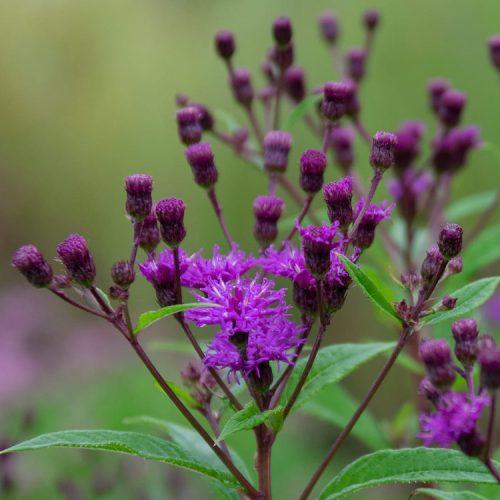Vernonia
The Vernonia genus is vast, with around 350 species of flowering plants belonging to the Asteraceae family. Some species, such as Vernonia Crinita (commonly known as Arkansas Ironweed), are appreciated for their rich purple blooms, while others are edible and of economic importance. Members of the Vernonia genus grow in many different parts of the world, including North and South America and various regions of Africa.
Showing the single result
Showing the single result
Vernonia
With clusters of violet-red flowers providing an abundance of nectar and pollen for foraging insects, Vernonia Crinita is one of the best bee-friendly perennials for a natural garden. Like all our eco-friendly grown plants, our bare-root Vernonia Crinita is 100% pesticide-free, so it’s safe for bees and butterflies.
Vernonia is a tall plant and needs plenty of room – it grows to around 1.5 – 2.5 metres tall after 2 – 5 years, with a maximum spread of 1.5 metres. Plant at the back of a border, where it will flower from midsummer to autumn.
Characteristics of Vernonia
Vernonia tolerates a sunny or partially shaded location with poorly drained soil but flowers best where it receives plenty of sun. Arkansas Ironweed thrives in most types of garden soil, including chalk, clay or loam. These perennials are fully hardy and ideal for cottage gardens, meadows and informal plantings.
Before planting, prepare the soil by digging in a generous amount of compost to help retain moisture. Plant Vernonia 40 cm apart and water thoroughly to settle in. Continue to water until established and throughout dry spells. Remove faded blooms to encourage more flowers. Mulching around the plants in spring will help to keep the soil moist and deter weeds.
You can propagate Vernonia by dividing plants in spring or by seed. Sow seeds in autumn and overwinter in a cold frame before planting out in spring.
Uses of Vernonia
In West and Central Africa, several Vernonia species, such as Vernonia Calvoana, Vernonia Amygdalina, and Vernonia Colorata, are popular as leafy vegetables with a bittersweet taste. Local names include bitterleaf, ndole and ewuro. In Nigeria, onugbu (bitterleaf) soup is a local delicacy of the Igbo people, and in Cameroon, the leaves are an essential ingredient of Ndolé, the country’s national dish.
Vernonia Galamensis is grown as an oilseed in Ethiopia and other parts of East Africa. The oil is used in manufacturing paint, plasticised coatings and as a reagent for industrial chemicals. Other species, such as Vernonia Crinita and Vernonia Amygdalina, are valued for their healing properties and are used in traditional herbal medicine.

